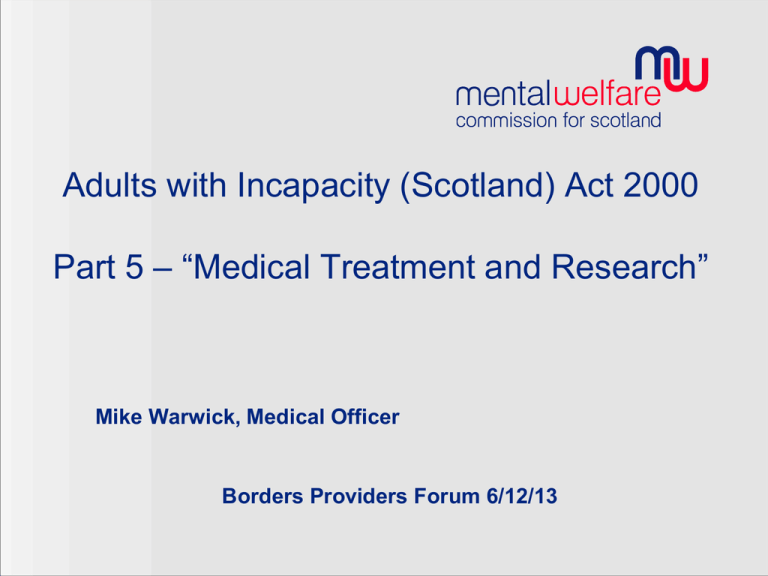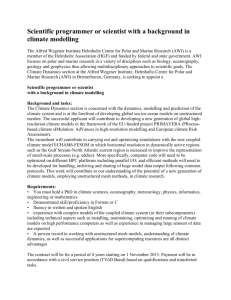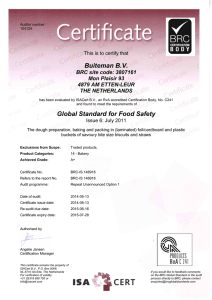
Adults with Incapacity (Scotland) Act 2000
Part 5 – “Medical Treatment and Research”
Mike Warwick, Medical Officer
Borders Providers Forum 6/12/13
Commission’s Role
• Independent organisation established under
the 1960 Mental Health Act
• Responsibilities to protect and promote the
rights and welfare of people with a mental
disorder
• Extended duties under new legislation – AWI
Act 2000, MH Act 2003, ASP Act 2007
• Accountable to Scottish Parliament
The wider role of the MWC
• Duty to give advice (S9 of the MHA) –
NB Telephone advice line
• Visiting individuals receiving care and treatment in
various settings and/or subject to certain orders under
the MHA and AWI
• Conducting investigations into concerns re personal
welfare or property of adult (S11 of MHA, S9 of AWI)
• Duties to cooperate with, and bring matters to the
attention of various agencies (S7 and 8 of the MHA and
S9 of the AWI)
Adults with Incapacity Act
Part 1- “General”
Includes:
• the Principles
• Definitions
• Sections on Sheriff and public bodies
including the MWC
“Adult” means anyone over 16
Adults with Incapacity Act - Principles
Everyone carrying out functions under the Act must
apply the general principles of:
• BENEFIT
• MINIMUM INTERVENTION
• TAKE ACCOUNT OF ADULT’S WISHES AND FEELINGS
• CONSULT OTHERS
• ENCOURAGE EXERCISE OF RESIDUAL CAPACITY
Adults with Incapacity Act
CONSULTING OTHERS
Principles include taking account of:
• The views of the nearest relative and primary carer of
the adult
• The views of any guardian, continuing or welfare
attorney who has powers relating to the proposed
intervention.
In so far as is reasonable and practicable to do so.
In AWI “incapable” means incapable of:
• (a) acting; or
• (b) making decisions; or
• (c) communicating decisions; or
• (d) understanding decisions; or
• (e) retaining the memory of decisions,
by reason of mental disorder or of inability to communicate
because of physical disability.
only if communication deficiency cannot be made good by
human or mechanical aid
Mental Disorder in AWI
Same meaning as in Mental Health (Scotland) Act 2003
• (a) mental illness;
• (b) personality disorder; or
• (c) learning disability,
• however caused or manifested;
Capacity
• Capacity is not an “all or nothing” concept
• Capacity is decision-specific
• A person can be capable of making a decision about one
treatment but incapable of making a decision about
another more complicated treatment
• e.g. someone with learning disability may be able to
understand and consent to paracetamol for pain but be
incapable of consenting to treatment for diabetes.
Adults with Incapacity Act
Part 2 – Continuing Powers of Attorney and Welfare
Powers of Attorney
Part 3 – Accounts and Funds
Part 4 – Management of Residents’ Finances
Part 5 – Medical Treatment and Research
Part 6 – Intervention Orders and Guardianship
Adults with Incapacity Act
CODE OF PRACTICE (Third Edition)
FOR PRACTITIONERS AUTHORISED TO CARRY
OUT MEDICAL TREATMENT OR RESEARCH
UNDER PART 5 OF THE ACT
http://www.scotland.gov.uk/Publications/2010/10/20153801/0
or Google “SG/2010/57” – the document reference
code
Part 5 does not apply to
Emergency Treatment
Common law allows medical treatment to be
given in an emergency to patients who cannot
consent.
This remains the case and there is no need to go
through the steps in Part 5 of the Act in order to
give treatment for the preservation of the life of
the adult or the prevention of serious
deterioration in the adult’s medical condition.
Code of practice covers in more detail and also
MWC’s Right to Treat good practice guidance.
AWI Part 5
Medical treatment is “any procedure or
treatment designed to safeguard or promote
physical or mental health”.
Section 47 allows authorisation of medical
treatment for an adult who “is incapable in
relation to a decision about the medical
treatment in question”
A Section 47 Certificate of Incapacity is
needed to authorise treatment
AWI Part 5
Section 47 certificate needed, but cannot alone
authorise treatments subject to further safeguards under
S48/Regulations
Need MWC-appointed Doctor arranged to approve:
• Drug treatment for the purpose of reducing sex drive,
other than surgical implantation of hormones.
• ECT for mental disorder.
• Abortion.
• Any medical treatment which is considered likely by
the medical practitioner primarily responsible to lead
to sterilisation as an unavoidable result.
AWI Part 5
Under S48/Regulations
Need Court of Session approval for:
• Sterilisation where there is no serious malfunction or
disease of the reproductive organs
• Surgical implantation of hormones for the purpose of
reducing sex drive.
AWI Part 5
Section 47 and Mental Disorder
• Section 47 cannot authorise treatment for mental
disorder for an adult to whom Part 16 of the Mental
Health Act applies (i.e. treatment of mental disorder
authorised under Mental Health Act).
• MWC advises advise using the Mental Health Act if it
is necessary to give treatment for mental disorder and
the person resists or objects to that treatment.
AWI Part 5
Who can assess the adult’s capacity and complete a
Section 47 certificate?
1. The medical practitioner primarily responsible for the
medical treatment of the adult
2. Since amendment of 2005, a dental practitioner;
ophthalmic optician; registered nurse if………………….
……….they have done the training, and are
primarily responsible for medical treatment of the kind in
question
Usually completion of S47 certificate falls to doctor (can be
AWI Part 5
This was removed from original code of practice after
the 2005 amendments:
A person acting on behalf of the medical practitioner
primarily responsible under his or her instructions or
with his or her approval or agreement could include any
member of the healthcare team involved in the adult’s
medical treatment, including other doctors, nurses,
nursing auxiliaries, physiotherapists, psychologists,
occupational therapists, phlebotomists etc. It could also
include dentists, opticians, chiropodists or other
professionals allied to medicine who might be asked at
different times to attend to an adult’s particular
healthcare needs.
Adults with Incapacity Act
Section 47 Certificate and Treatment Plans
See Handout
Annex at back of code of practice gives directions
for completion
Section 47 printable .pdf at:
http://www.scotland.gov.uk/Topics/Justice/law/awi/forms/M
edical-Report-Forms
Treatment plan – I am not aware of any blank proforma other
than the one in the code of practice.
NB this lacks prompt for name of person signing in print,
designation, address and date. Best if can be added.
Adults with Incapacity Act
Scottish Government Section 47
Certificate proforma does not have
to be used.
An local electronic certificate can be
created as long as the wording is
exactly the same as the wording on
the Government’s form.
Section 47 certificate
• Should be completed in line with the Principles
including consulting carer and nearest relative.
• Entries on the Certificate or treatment plan can
include “Fundamental Healthcare Procedures”
• Otherwise should be named conditions.
• New medical treatment for new conditions in
future will not be covered.
• General catch-all entries do not meet the
requirements of the legislation and will not cover
specific treatment.
A treatment plan I saw recently
• Fundamental healthcare procedures + routine
treatment of chronic diseases + intercurrent
illnesses as detailed in the hospital, nursing and
GP records.
• LD + cerebral palsy
• Irregular periods
• Bladder instability
Very good - Covers all treatments, but still has
generalised statement.
Section 47 certificate
• Covert medication should not be put
on S47 certificate:
the treatment should be, but how to
give it is a care planning issues.
Section 47 certificate
Provides “general authority to treat” with exceptions.
(1) If there is a welfare proxy with power to make decision
re medical treatment
and the person who completed the certificate is aware of
this
and it would be reasonable and practicable for them to
obtain their consent but they have not done so………….
The S47 certificate provides no authority to treat
(See code of practice page 18. If person completing certificate suspects
there may be a welfare proxy, it would be good practice to check with
close relatives.)
“General authority to treat” exceptions.
(2) If an application for an intervention order or a
guardianship order with power in relation to
medical treatment has been made to the sheriff
and not been determined. MWC have concerns
re this. If situation occurring phone us.
(3) If there has been an interdict granted that
prohibits the provision of the treatment.
(4) Where there is unresolved welfare proxy dispute
in process or application has been made to Court
of Session. See Medical Treatment Flowchart.
But…..in all of these situations can give treatment
to preserve life or prevent serious deterioration.
Section 47 “shall not authorise”…….
“the placing of an adult in a hospital for the treatment of
mental disorder against his will” (Mental Health Act
would be needed for this)
Or………
“the use of force or detention, unless it is immediately
necessary, and only for so long as is necessary in the
circumstances”
Section 47 certificates and
Care Homes
• Care Inspectorate check use of Part 5 for
residents on some inspections.
• MWC have undertaken unannounced visits in
care homes and hospitals to review use of Part 5
• Care home staff are advised that they should
know medication they are supporting people to
take is prescribed within the law.
• They are encouraged to ask GPs for copies of
S47 certificates to keep in care home.
Guardianship
and
Care Homes
Covert medication
• Related issue.
• MWC have issued good practice guidance.
• Nobody who can make a capable decision to
refuse treatment for physical disorder would be
given covert medication.
• All would need to have the medication covered
by Section 47 certificate.
• The exception would be where they are receiving
treatment for mental disorder under Mental
Health Act and that is given covertly.
Draft update
of this
guidance is
now on
website for
consultation
mwcscot.org.uk






